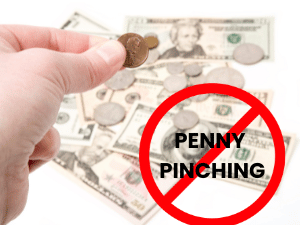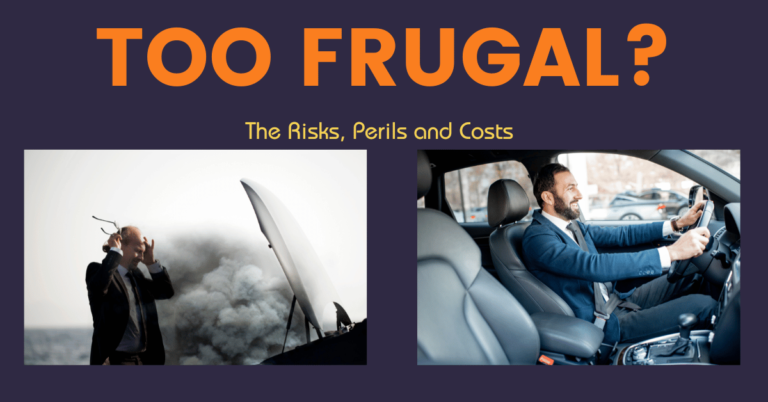What is “Being Frugal?”
Frugality is generally seen as a positive trait—one that reflects prudence, simplicity, and thoughtfulness in financial decisions. By definition, “being frugal” means being sparing or economical with regard to money or food. Living frugally can promote a mindful approach to spending and a deep appreciation for resources. It fosters a sense of stewardship, ensuring that nothing is wasted and that financial decisions align with long-term stability.
However, when frugality is taken too far, it can transition from a virtue into a liability. That’s when it stops being frugality and starts becoming “cheap.” And being cheap can cost you far more in the long run.
When Being Frugal is Taken Too Far
Frugality is about making wise financial choices; being cheap is about focusing on the lowest cost without considering value. When cost becomes the only factor in decision-making, it often leads to unintended consequences—sacrificing quality, durability, and even safety. Let’s explore some real-life examples of when extreme frugality backfires.
1. Skipping Maintenance to Save a Few Bucks
Owning a car is a great example of where frugality vs. cheapness plays out. A frugal person understands that regular oil changes, tire rotations, and necessary repairs help extend the life of the vehicle, reduce the likelihood of expensive breakdowns, and maintain resale value.
A cheap person, on the other hand, might skip oil changes to save a few dollars. While this saves money in the short term, it increases the risk of engine damage, which could lead to costly repairs—or even necessitate a full engine replacement. The same applies to home maintenance, where avoiding minor fixes can lead to significant and expensive problems later on.
This may seem overly simple, but we treat ourselves like our cars. Are you skipping your “regular maintenance” and “services”? What type of crash or breakdown can your foresee from doing this?
2. Buying the Cheapest Option—Again and Again

A frugal person understands the balance between cost and quality. They might pay more upfront for well-made shoes, a durable winter coat, or a reliable kitchen appliance, knowing that it will last for years.
A cheap person, however, might always opt for the lowest price, regardless of quality. This often results in repeatedly replacing cheap items that wear out quickly—ultimately spending more money over time than if they had invested in a higher-quality option from the start. As the saying goes, “Buy nice or buy twice.”
3. Cutting Corners on Health and Wellness
One of the worst areas where excessive frugality can be costly is personal health. A frugal person might look for affordable ways to stay healthy—choosing home-cooked meals over fast food, shopping for health insurance that fits their budget, or taking advantage of preventative care options.
A cheap person might skip doctor visits, ignore dental checkups, or buy the lowest-quality food available just to save money. In the long run, this can lead to more severe health problems that require expensive medical treatments—costing far more than what was saved.
4. Ignoring Education and Professional Development
Education and skill-building are investments, not expenses. A frugal person might look for scholarships, discounted courses, or free learning resources to advance their knowledge and career prospects. This is one area you should NOT skimp on. If you don’t get mentorship or coaching, you will largerly stay stuck exactly where you are for much longer. Investing you professional development with a coach or mentor.
A cheap person, on the other hand, might refuse to spend any money on books, training, or networking events, thinking they are unnecessary expenses. However, the lack of personal and professional growth can limit career opportunities and income potential, ultimately leading to financial stagnation.
The Key: Balancing Frugality and Value
Frugality is about making smart, intentional financial decisions. It involves looking at the bigger picture and understanding that the cheapest option isn’t always the best. Being truly frugal means balancing cost, quality, and long-term benefits. Remember, you are a steward of your own limited resources. You are the one that will have to define what is the balance between current expenditures and investing for future growth.
To avoid the pitfalls of excessive frugality, ask yourself:
- Will this decision cost me more in the long run?
- Am I sacrificing quality, safety, or well-being just to save a few dollars?
- Is this something that will benefit or grow my business in the future?
- Does this purchase align with my values and long-term goals?
By focusing on value rather than just cost, you can ensure that your frugality works for you—not against you. Being mindful with money doesn’t mean being cheap—it means being wise.
Does this information feel right to you? Are you stuck in being cheap out of fear, habit or lack of awareness? Mindset and business coaching can help teach you a more affective, responsible way to grow and manage your business. Contact us today to discuss what coaching and support options we offer.

